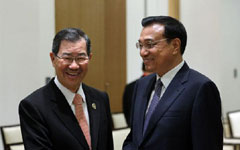Businesspeople from both Chinese mainland and Taiwan expect improved cross-Straits cooperation in developing free trade zones, according to executives at an industry exposition in Xiamen.
In the face of global economic and trade liberalization, developing FTZs has become a common theme in both regions, said Chan Hou-sheng, chairman of Taipei-based Cross-Straits Common Market Foundation, at the 18th China Xiamen Machinery & Electronics Exhibition, which concluded on Tuesday.
"Both the Shanghai FTZ and Taiwan's free economic pilot zone indicate new business opportunities for enterprises on both sides of the Straits, and it is urgent for the two sides to begin cooperation," Chan said.
He suggested that both sides hold symposiums and invite pertinent authorities to exchange expertise on such topics as liberalizing interest rates on foreign currency loans or facilitating offshore financing.
|
 |
 |
"Taiwan still has not opened up its manufacturing and services sectors to mainland capital. Such restrictions will jeopardize the capital flow, an important factor in cooperation between free trade zones," Li said.
"After reaching a consensus, both sides should establish a coordination team to work on feasible policies and measures to help loosen the limitations," he said.
Chang Guang-ping, director of Taipei-based Topology Research Institute, said that in addition to a free flow of capital, talent exchanges should also be highlighted.
"As research and development have lately been prioritized in cross-Straits cooperation, it is important to lower the free trade zones' access threshold for R&D talent and create a convenient working environment for them," Chang said.
The China (Shanghai) Pilot Free Trade Zone, which began operating last September, is a 28.78-square-kilometer district billed as a test site for deepening market-oriented reforms. The State Council has approved the opening-up of 23 service industries in the Shanghai FTZ. So far, 19 of them have been realized.
Taiwan's plan to launch a Free Economic Pilot Zone was approved last August and implemented by integrating seven free trade zones that include the ports of Taipei and Kaohsiung. The pilot zone is now entering its second phase, which is subject to approval from the Taiwanese legislature.
Recent years have seen increased financial cooperation between the Chinese mainland and Taiwan. The trade volume between the two sides reached $197.2 billion last year, marking a 16.7 percent jump year-on-year.
